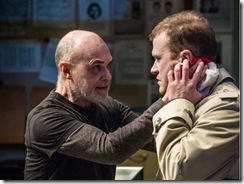Butcher: Message gets lost in physicality

What is it in us that turns a seemingly normal human being into a monster, capable of unspeakable acts? What triggers a terrifying, unstoppable evil in us? Furthermore, is a perpetrator any more a monster than his victim in search of revenge? What Nicolas Billonn tries to explore in his play Butcher is the violent side of human nature, and its thirst for revenge at any cost. The instinct, as old as humanity (“eye for eye, tooth for tooth”) is forbidden by societies, but in reality still embraced by humans, shows how little it takes to reach the realm of hatred – the kingdom of insane distraction, the dark place in us that leads to perdition, a road with no open ends and no chance of coming back. What is the strength of that horrific path that makes us confuse justice with ravage intentionally? Nicolas Billonn’s play promises exploration of all these.
It is 25 years after a civil war in an imagined Eastern-European country. A former officer who worked in a prisoner’s camp at that time is tracked down and caught by a group of his former enemies, including a woman who was his victim. They bring him in a staged police station where the drama unfolds, and revenge takes place. Unfortunately, though promising a lot, the play does not deliver.
The trouble is that the play insists too much on physical elements, such as torture, pulled out fingernails, and cutting into flesh. So, of course, it does not leave much time or space to develop ideas. The strong connection between a monstrous act that took place 25 years ago and the revenge happening today – cause and effect – is lost. With it all relevance to the subject is gone, together with depth, exploration and even the questioning of the human nature.
The story starts with a light humour, continues as a crime story about a cold-blooded murderer resembling psychopath characters in numerous American TV series, and finally, at the end, adds the explanation of the setup. Only the very last short dialogue touches on what should have been the leitmotif of the play – emotions, psychology and the drive behind evil. Of course, by this point, it is too little and too late, so the exchange sounds unconvincing.
The story about Butcher, his victims and the aftermath might be possible in real life, but let’s not forget that “life,” in this case took 25 years to develop, while the stage has only 90 minutes to present it. Since the focus is so overwhelmingly on physicality, any deeper meaning the performance tries to explore pales in comparison. The man wanted for war crimes becomes a victim, and victim becomes a criminal. There is no space for neutrality or deeper thinking as undivided sympathy goes to the Butcher and his son – Josef Džibrilovo (John Koensgen) and Hamilton Barnes (Jonathan Koensgen).
John and Jonathan Koensgen manage to create very live, even loveable characters. John Koensgen as Josef Džibrilovo lives through his last moments with true pain and fear. Still, the passion and emotions that are long ago inbred irrevocably in his mind and soul fire up when provoked. Jonathan Koensgen as Hamilton Barnes is natural in the roles of a lawyer, a son and, above all, an innocent victim. He conveys the only strong message in the whole play: that the real victims of senseless hatred, crime, conflict or revenge are the innocent ones.
Butcher plays at Great Canadian Theatre Company until March 20, 2016
Butcher
Written by Nicolas Billon:
Directed by Eric Coates:
CAST
Sean Devine: Detective Lamb
John Koensgen: Josef Džibrilovo
Jonathan Koensgen: Hamilton Barnes
Samantha Madely: Elena
Maggie Mojsej: Young Girl